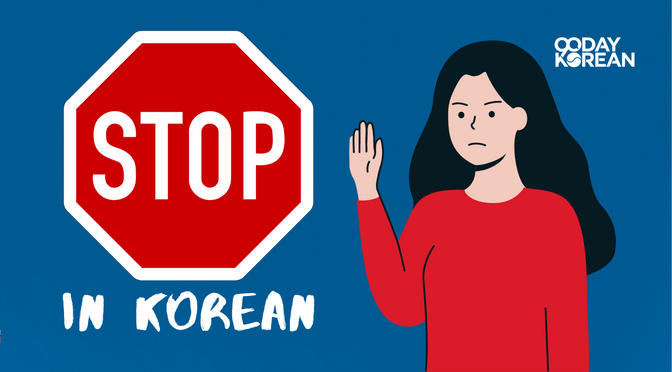Let’s talk about how to say “stop” in Korean. Whether you intend to tell someone to stop what they are doing or describe how someone or something stopped moving, it’s possible to express both very conveniently in Korean.
Let’s get to it!
Contents
How to say “stop” in Korean
The basic form to use when talking about stopping something is 그만하다 (geumanhada) which is often used especially to describe that you stopped or quit doing something or you are telling someone to stop doing something. On the other hand, 멈추다 (meomchuda) also means “stop” but is usually more specifically used to describe movement.
Below, you can find ways to say “stop” in Korean, categorized into different levels of formality.
Formal “Stop” in Korean
There are several ways to say “stop” in Korean formally. It is good to use the formal version of this word in situations such as conducting a presentation. Adding the ㅆ to the verb makes it the past tense.
1. 멈춥니다 (meomchumnida)
2. 멈췄습니다 (meomchwotseumnida)
3. 그만합니다 (geumanhamnida)
4. 그만 뒀습니다 (geuman dwotseumnida)
Example:
광고에 좋은 반응을 못 얻어서 그만 뒀습니다 (gwanggoe joeun baneungeul mot eodeoseo geuman dwotseumnida)
We stopped running the advertisement because we couldn’t get a positive response to it.
Standard “Stop” in Korean
These can be used in almost any daily conversation. You might use this with people that you’re not that close with, co-workers, store clerks, or acquaintances who are older than you.
1. 멈춰요 (meomchwoyo)
2. 멈췄어요 (meomchwosseoyo)
3. 그만해요 (geumanhaeyo)
4. 그만 뒀어요 (geuman dwosseoyo)
Example:
차가 막혀서 버스가 멈췄어요 (chaga makyeoseo beoseuga meomchwosseoyo)
The bus stopped because of traffic.
Informal “Stop” in Korean
The informal version can be used when speaking to someone close to you (but the same age or younger) or someone who’s much younger than you.
1. 멈춰 (meomchwo)
2. 멈췄어 (meomchwosseo)
3. 그만해 (geumanhae)
4. 그만 뒀어 (geuman dwosseo)
Example:
이런 잔소리를 이제 그만해 (ireon jansorireul ije geumanhae)
Stop nagging like this now.
그 일은 너무 힘들어서 그만 뒀어요 (geu ireun neomu himdeureoseo geuman dwosseoyo)
I quit that job because it was too hard.
Other ways to say “stop” in Korean
The word “stop” can refer to other similar things. It can refer to a temporary or a permanent type of stopping. Here are some other ways to express those.
1. “Quitting” in Korean
그만두다 (geumanduda) means basically the same as 그만하다 (geumanhada), but by replacing 하다 (hada) with 두다 (duda) the word 그만 (geuman) gets more emphasis, and the word truly becomes to mean quitting/stopping something for good.
More so than 그만하다 (geumanhada), 그만두다 (geumanduda) is heard when someone is describing quitting their job.
2. “Halt” in Korean
중단하다 (jungdanhada) specifically means something wasn’t continued or something was halted, such as the production of a good. Both 멈추다 (meomchuda) and 그만하다 (geumanhada) can be used interchangeably with 중단하다 (jungdanhada) in this meaning – however, 중단하다 (jungdanhada) specifically only means this type of stopping.
3. “Finish” in Korean
끝나다 (kkeunnada) also means “stop” as a way of describing the ending of something, such as a school lecture or a relationship. If you want to emphasize that you have ended something, the verb can change into 끝내다 (kkeunnaeda).
Wrap Up
Now that you know how to say “stop” in Korean, get out there and tell people what you plan on stopping!





how do you say yes in Korean
Hi, Cori! ^^ Please check this link for the answer! (https://www.90daykorean.com/yes-in-korean/)
Do you just add “yo” at the end of a word to make it formal?
Hi, Lillian! Often, you need to change the form! Please check this link for the details: https://www.90daykorean.com/korean-sentence-structure/. ^^
how do you “dont stop” ?
Hi kazioo21! You can say 멈추지 마세요 [meomchuji maseyo]. ^^
So what is geumanhaja meaning!
Hi Ria! It means “Let’s stop”. ^^
i thought it was hajima
I thought hajima was ‘dont do it’. Korean is tricky
Hi nuuna! You can also use it ^^